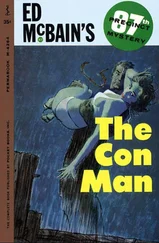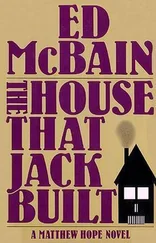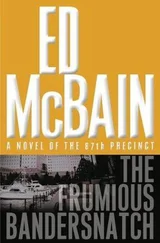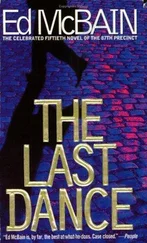Ed Mcbain - The Heckler
Здесь есть возможность читать онлайн «Ed Mcbain - The Heckler» весь текст электронной книги совершенно бесплатно (целиком полную версию без сокращений). В некоторых случаях можно слушать аудио, скачать через торрент в формате fb2 и присутствует краткое содержание. Жанр: Полицейский детектив, на английском языке. Описание произведения, (предисловие) а так же отзывы посетителей доступны на портале библиотеки ЛибКат.
- Название:The Heckler
- Автор:
- Жанр:
- Год:неизвестен
- ISBN:нет данных
- Рейтинг книги:4 / 5. Голосов: 1
-
Избранное:Добавить в избранное
- Отзывы:
-
Ваша оценка:
- 80
- 1
- 2
- 3
- 4
- 5
The Heckler: краткое содержание, описание и аннотация
Предлагаем к чтению аннотацию, описание, краткое содержание или предисловие (зависит от того, что написал сам автор книги «The Heckler»). Если вы не нашли необходимую информацию о книге — напишите в комментариях, мы постараемся отыскать её.
The Heckler — читать онлайн бесплатно полную книгу (весь текст) целиком
Ниже представлен текст книги, разбитый по страницам. Система сохранения места последней прочитанной страницы, позволяет с удобством читать онлайн бесплатно книгу «The Heckler», без необходимости каждый раз заново искать на чём Вы остановились. Поставьте закладку, и сможете в любой момент перейти на страницу, на которой закончили чтение.
Интервал:
Закладка:
She stared at her husband in solemn wonder because there were times when he seemed to be such an insensitive lout, times when he seemed to be only the uncouth slob who told dirty jokes in a detective squadroom and who brought all of his grubbiness home with him, times when she felt alone in her silent world without even the comfort of the person who had been to her the one shining spark in her life, and then suddenly—suddenly there he was again, the person she had known all along, her Steve, the person who knew the things she was feeling, who had felt them himself, and who could talk about them until, until….
“And you want it to be that way again, honey, that wild crazy young flying way that was for kids, Teddy, but we’re not kids, anymore. So you dressed yourself up for me tonight. It’s Fanny’s day off, so you rushed the kids into their beds, and you put on your black shorty nightgown—I saw it when the wind caught your robe—and your good silk robe and your fancy high-heeled slippers, and you put that shadow all round your eyes, and you left your lips naked and Teddy, Teddy baby, I love you anywhich way you are, in a potato sack, or digging in the back yard, or right after you had the babies and they rolled you in all sweaty and stinking on the maternity table, or taking a bath, or cooking, or swimming, dressed, naked, reading, weeping, baby, baby I love you and it only gets better all the time and I’ll be goddamned if I’m going to cater to your silly back-to-seventeen movement and get all excited because you’re in a nightgown and high-heeled pumps, especially, especially when I’ve been planning on exactly this all day long, all goddam day long! Take your fingers off my mouth, I want to kiss you.”
He kissed her, and he didn’t ask her afterward whether or not there was any of that flying jazz they had known as kids, or whether or not the world went up in neon, and whether or not Mongolian gongs and bugles went off—he didn’t ask her. Instead he slipped the robe from her shoulders, lowered it to her waist, kissed the full rich globes of her breasts, felt her trembling beneath his fingers, and carried her to the new grass lining the patio. And then he held her to him naked, and he didn’t ask her anything, and she didn’t say anything, and whereas neither of them flew and whereas there was no flash of neon and no crashing of gongs or bleating of bugles, he had the distinct impression that the sky was crumbling and that he was about to fall off the edge of the earth. And, from the way she clung to him so desperately, he knew she was experiencing the same odd sensation.
5.
THE SQUADROOM WAS JAMMEDto capacity on that Friday, April 10. Sometimes it just happened that way. There were days when the man who was catching barely had anyone to talk to. Everybody else on the team was out preventing crime or collecting graft or some damn thing. But on that Friday, April 10, that old squadroom was just the most bustling old place on Grover Avenue. Detectives, patrolmen, the lieutenant, the captain, messengers from downtown, citizens making complaints—everybody seemed to be in the room that morning. Telephones rang and typewriters clattered and the place had the air of a thriving, if small, business concern.
At the desk closest to the grilled windows that faced the street, Meyer Meyer was on the telephone talking to Dave Murchison, the desk sergeant.
“That’s right, Dave,” he said. “Sandhurst Paper Company in New Bedford, Massachusetts. What? How the hell do I know where New Bedford is? Right next to Old Bedford and Middle Bedford, I guess. That’s the way it usually works, isn’t it?” he paused.
“Right. Buzz me when you’ve got them.” He hung up to find Andy Parker standing alongside the desk.
“There’s also,” Parker said, “East Bedford and West Bedford.”
“And Bedford Center,” Kling put in.
“You guys got nothing to do but clown around?” Meyer asked. “Come on, look alert. Suppose the Chief of Detectives should walk in here?”
“He can’t,” Parker said. “He’s downtown running the lineup. He wouldn’t come visit no grubby squadroom like this. Downtown, they give him a microphone and a bunch of bulls who have to laugh at his crumby jokes every morning.”
“Except Fridays, Saturdays and Sundays,” Kling said. “Today is Friday.”
“That’s right,” Meyer said. “So you see, he just might walk in here and find you with your thumb up your behind.”
“The fact is,” Parker said, “I only come in here to see if there was any messages for me. Because maybe you didn’t notice it, but I’m dressed for a plant, and in exactly”—he shoved back his cuff and looked at his wrist watch—“in exactly forty-five minutes, I’ll be leaving you gentlemen to take up my position in the candy store.”
“What are you supposed—”
“So don’t make no cracks about my working or not working. I go on at ten-thirty, and that’s that.”
“Yeah, but what are you supposed to be dressed as ?” Meyer asked.
In truth, the question was not put in jest. For whereas Andy Parker may have felt he’d donned a costume for his candy store plant, the fact was that he looked much the same as he always looked. Which was to say, he looked like a slob. There are people, you know, who always look like slobs. There’s simply nothing to be done about it. This tendency toward sloppiness first exhibits itself when the subject is still a child. Dress him for a birthday party and five minutes later he will look as if he’d been ran over by a steamroller. Nor will he look that way because he’s run through a mud puddle or anything. Oh, no. He will simply look that way because he has within him, inside his beating little heart, the makings of a true slob. It is not good to discourage slobs. They will become slobs anyway.
Andy Parker was a true slob. Five minutes after he’d shaved, he looked as if he needed a shave again. Ten minutes after he’d tucked his shirttail into his trousers, the shirttail was hanging out again. Fifteen minutes after he’d shined his shoes, his shoes were scuffed again. Listen, that was the way he was. Did this necessarily make him a bad cop? Absolutely not. His being a bad cop had nothing whatever to do with his being a slob. He was a slob, and he was a bad cop—but the two phenomena were not at all related.
In any case, Lieutenant Byrnes had planted Andy Parker in a candy store on North Eleventh with the idea of getting him to smell out the alleged pushers who were peddling their lovely little packets of junk in that spot. Andy Parker was supposed to look like a junkie. It hardly seems necessary to explain, in this communications-enlightened day and age, that a junkie is not a man who buys and sells scrap iron. A junkie is a person who buys junk. Junk is dope. A junkie, in short, is a drug addict—as if you didn’t know. Now, Parker had seen a great many junkies throughout his career and it could be assumed that he knew what a junkie looked like. But if the casual observer took his “costume” as an indication, that observer would be forced to conclude that a junkie looked like Andy Parker. For although Meyer Meyer was studying him quite closely, Andy Parker seemed to be dressed the way he always dressed. Which was like a slob.
“Don’t tell me what you’re supposed to be,” Meyer said. “Let me guess.” Meyer wrinkled his brow. “A floorwalker in a department store. Am I right?”
“That’s what he’s supposed to be,” Kling said. “Only, Andy, you forgot a carnation in your lapel.”
“Come on, don’t kid me,” Parker said seriously.
“Then what could he be?” Meyer said. “Just a minute, I’ve got it! An usher at a fancy wedding!”
Читать дальшеИнтервал:
Закладка:
Похожие книги на «The Heckler»
Представляем Вашему вниманию похожие книги на «The Heckler» списком для выбора. Мы отобрали схожую по названию и смыслу литературу в надежде предоставить читателям больше вариантов отыскать новые, интересные, ещё непрочитанные произведения.
Обсуждение, отзывы о книге «The Heckler» и просто собственные мнения читателей. Оставьте ваши комментарии, напишите, что Вы думаете о произведении, его смысле или главных героях. Укажите что конкретно понравилось, а что нет, и почему Вы так считаете.












